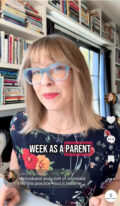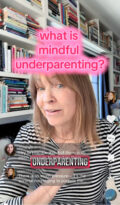Dear fellow wonderer,
In the lead-up to writing you this week I felt a little bored with the topic I’d made for myself. I’d planned this month to be a sort of follow-up to last month’s theme of how focusing less on kids might be better for them. Part Two: How might focusing less on kids benefit adults?
I’m not sure this constant churning-out of videos is working for me (more on that below) and anyway, I’d pretty much hashed out all I wanted to say in the videos.
But then as serendipity would have it, a couple juicy newsletters on parenthood showed up in my inbox the other day within (exactly!) an hour of each other. Juicy newsletters that had me ditching my workout to peck out responses on my laptop, my brain no longer bored! And later that morning, driving and mulling, a single shimmery thread appeared in my mind, stitching together the videos, the newsletters, the comments with a common message: sometimes the best solutions are the simplest.
Let’s see if I can spread out this quilt and show you what I mean.
In the first video I shared this month I chatted about a practice that turned out to be one of the best things Chris and I did for our family: each of us had a weekly night out to do our own thing. On Chris’ night, he’d play in a band; on mine, I’d write in a cafe. I can’t remember how we landed on this routine. Chris figured out pretty early in our marriage that I’m a happier person if I have time to write–maybe he suggested it? In the video I talk about how this routine was fantastic for both of us, obviously, but it was also good for our kids. On a weekly basis they saw how we prioritized our creativity. And those Wednesday nights out? I anticipated them all week. They kept me writing at a time in my life when I wasn’t often managing it otherwise.

[on TikTok, Instagram, Substack]
A regular night out. A simple practice. And yet, when I’ve shared what Chris and I did with other parents, they often respond as if the idea is revolutionary. And in many ways, for our family, it was!
(I love that this video got over 100 shares on TikTok. I like to think those shares were viewers dreaming and hoping and scheming to do something similar for themselves.)
Another video came from watching a comedian riff on the notion that while growing up in the ’90s, his mom didn’t plan a bunch of weekend activities for him–like so many of today’s core-memory-chasing parents do–but rather she lugged him along on whatever she was doing. His video generated more than 7,000 hearts on TikTok for the comment: I was dragged around carpet shops. I connected his thoughts to an opinion piece by clinical psychologist Darby Saxbe called “Is Underparenting Good or Bad for Kids?” (that’s a New York Times free gift link) about why bringing kids along on whatever we adults are doing is not only a practice with deep evolutionary roots, but one that can also offer benefits for the kids. It allows them to witness what adult life looks like, and it teaches them how to entertain themselves, especially if you don’t immediately put a screen in their hands. And the obvious benefit for adults: you can get on with your life! Whether that be bringing your four-year-old along to a workout, as Saxbe watched unfold at her gym, or cleaning the house and getting the damn vegetable garden planted, which is what Chris and I did many weekends when our kids were young. Sure, we planned little spots of fun for them on the weekends–pizza and movie, maybe a hike in the redwoods, a birthday party–but they spent a lot of time entertaining themselves nearby while we did our stuff. They were very skilled self-entertainers.

[on TikTok, Instagram, Substack]
Again: a simple solution.
On TikTok, my video about why dads need friends got an instant comment: are you even for real? Ha–I suppose the viewer thought men were the last people some chick should be worrying about? But I do worry about men and specifically how many don’t have ongoing friendships. In a New York Times personal essay, “Where Have All My Deep Friendships Gone?” (another free gift link) Sam Graham-Felsen writes movingly about how his male friendships dwindled with marriage, and especially with fatherhood. He notes that in a 2024 study by the Survey Center on American Life, 17% of men had zero close friends–a fivefold increase since 1990.
I pointed out in the video that my husband’s night out with his band meant he was getting friend interaction on a weekly basis. My friend’s husband has a weekly game night with his friends. Interestingly, when our two husbands met, they hit it off right away, and started hanging out. I can only surmise that since both are men with lots of male friends, this felt natural.

[on TikTok, Instagram, Substack]
Again, a pretty simple parenthood solution that benefitted everyone. Happier dad; happier kids. Plus the kids saw male friendship modeled. (My husband and this buddy still go on backpacking trips with our grown kids. So great.)
So these ideas were already marinating in my brain brine when Katherine Goldstein’s newsletter The Double Shift –a fantastic project on community-building–showed up in my inbox. Her latest letter looks at “some controversial ideas” about what Goldstein calls the “Kids Activity Doom Loop.” In other words, the usurping of daily family life by kids’ activities–often for-profit sports leagues. She writes, “I’m calling it out as a part of the culture that is holding us back from building meaningful adult community.”
Goldstein lays out bunch of alarming statistics about how this shift is playing out in families. Consider: “A 2025 National Youth Sports Parents survey found that parents spend an astonishing 3 hours and 23 minutes per day supporting their kids’ sports activities, including driving, prepping meals and snacks, attending practices and games, and coordinating logistics.”
!!!!
I left a comment applauding her take and her research, and adding my own concern: This also really eats into the free time kids once had to play and daydream and figure out who they are, which I’m convinced is a big part of why so many young people are struggling with mental health and independence…
That’s my personal battle, as you know, but Goldstein is also grasping something vital. Endless kid activities undermine community-building. One of the simplest ways I know to build community with other families is to meet up at a park on a regular basis. But you can’t do that if everyone is at ballet rehearsal or two hours away at a soccer tournament.
Which leads me to the other newsletter that arrived in that same hour.
In her excellent Motherhood Until Yesterday, a newsletter about the “mismatch” between evolution and modern-day child-rearing, Elena Bridgers wrote about how creating “the village” that everyone says moms need to ease motherhood actually requires a lot of work from said moms. Again, I felt compelled to write back, a comment about my own community, a community I helped build as a young homeschooling mother. I agreed that community-building can be hard, writing: Yes, it was an effort getting to the park each week. Yes, it was awkward approaching the group when I was new. Yes, the quarterly planning meetings were a pain in the ass.
But I want to tell you, as a mother of grown children, what spending years in such a community offered me. And then I proceeded to share what I never could have imagined back when I started bringing my kids to the park: how this community would benefit everyone in my family–even my friend-needing husband–to this day and, I’m guessing, for the rest of our lives. Here’s my mini memoir of a comment, if you’re interested.
I did not expect that comment to resonate with as many people as it’s seemed to. (To be honest, I’m not sure Bridgers appreciated having a homeschooler hijack her comments section–she didn’t “like” it; nor did she “like” comments from other homeschoolers. I’m not surprised. There are a-million-and-one preconceptions about homeschooling and lots of folks discount and take no interest in what we have to say, which I think is a shame. Sometimes people who experience life outside a system–like homeschoolers–have insights that might offer possibilities for people still in that system–in this case, for childhood and education at large. sigh. Someone should write a book about this. D’oh!)
Anyway, this brings us back to the shimmering golden thread: simplicity. My homeschooling community started very simply. A few moms and kids (and the occasional dad) met weekly at a park. That’s it! Those days at the park grew organically and eventually a rich, lifelong community emerged.
How we’ve complicated parenthood! Parenthood is freaking hard and parents are stressed at national health crisis levels, yet we keep making it harder, focusing all our time and expectations on our kids and what they’re doing. All this “maximization” is, in my mind, making everyone miserable.
What if we tried to simplify? Scheduled kids less. Allowed more time for us adults to do our thing. Registered our kids for a single interest, something local, instead of that traveling team. Met up at the park. Signed kids up for low-key, play-based afterschool care instead of a weekly litany of expensive extracurriculars. (Of course, that relies on afterschool care being a universal option; not a limited program requiring lotteries!) What if, instead of planning color-coordinated insta situations for our kids that we hope they’ll remember when they’re 80, we simply dragged them to the carpet shop and let them roll around and whine among the loop piles and shags?
What if?
xo,
Patricia
P.S. It was an interesting experiment to try flipping the script on this newsletter for a couple months, making videos on a common theme and then digging into the responses at the end of the month in this newsletter. But frankly, making all of those videos was exhausting, and it did almost nothing to raise the social media numbers that I’ve heard literary agents want to see. So, forget that! I’ll probably continue to make a video here and there when I’m riled up, but for the most part I’m going to focus on revising my book and connecting with you here. Damn the numbers, bring on the real connection and conversation. And I think I’ll reconstitute the Wonder Room, show up in a few weeks with some fun links. Keep things, you know, simple.
This letter was cross-posted at Substack.

